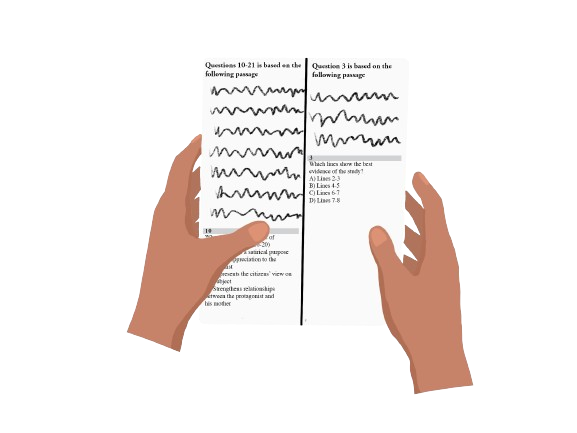
Since 1959, students from around the country have taken the PSAT/NMSQT (Preliminary SAT/National Merit Scholarship Qualifying Test) on paper. However, for the first time, these tests are going digital. The PSAT was digital this fall, and the SAT will be in spring 2024.
With the test now being strictly digital going forward, College Board’s BlueBook software offers many unique online tools including a countdown clock, a way to mark questions for review, a built-in graphing calculator and a reference sheet that consists of common formulas for the math sections. While every student receives the same test and questions on the physical PSAT, each student’s digital test is adapted dynamically based on their performance within the test.
The digital PSAT came with many resources and even allowed students to prepare by taking practice tests using their online resources.
“The digital PSAT came with a free calculator … it also [came] with all of the formulas … there’s a little banner that goes to the top and you could see all those tools that you would need, so instead of having to flip through the pages, it’s just right there for you,” junior Benjamin Pyle said. “The interface was definitely helpful.”
Despite the plethora of resources that were offered by College Board, during the test, a handful of students faced technological problems: software issues, a lack of charged computers and internet issues.
In order to avoid experiencing numerous technological issues during the test, Chief Technology Officer Alex Podchaski and his team began preparing last spring.
“We made sure that we had the network bandwidth available on campus, making sure that we knew what software needed to be run, testing things on our computers and then getting ready with instructions and processes,” Podchaski said.
Special arrangements or accommodations are an important part of the PSAT for students since they give aids to students who face specific educational challenges. The digital PSAT made it especially challenging for students with accommodations such as extended time, breaks, screen reader, dictation for essays, etc.
“They need [accommodations] in order to level the playing field so they can function and show what they know in the same way as kids without accommodations do,” Guidance Counselor Christine Hempsted said.
The most common accommodations include extended time, reading and math accommodations, and extended breaks. Students who apply for accommodations generally need to contact their school and College Board to apply for accommodations on the PSAT.
However, virtual testing puts disabled students at a disadvantage. According to a report by the Center for Democracy and Technology, graduate student, Ehlers Danlos Syndrome and low vision, had accommodations which included being able to take breaks between sections to use the restroom, eat and take medications during her test. However, her proctor required her to remain in camera while taking medications.
“By the time I got to the last section of the LSAT, I had to pee so badly that I was just clicking through answers trying to complete the test,” Courtney Bergan said, according to the Center for Democracy and Technology.
While the new PSAT might have been stressful for students and teachers who prefer paper and pencil, it may have positive aspects.
“I went into it obviously thinking that I would prefer the paper PSAT … I think now that I say that honestly both versions are just fine,” Pyle said. “You shouldn’t really have a problem with either version, as long as you’ve obviously come prepared.”



